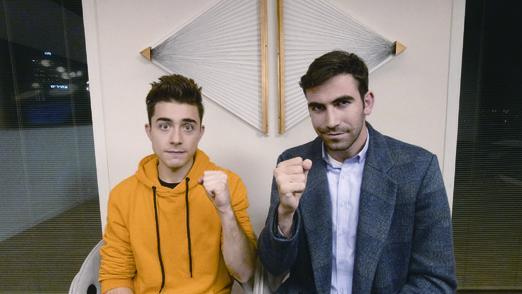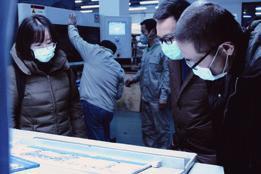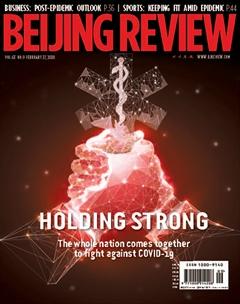A RECORD SIXTEEN DAYS
By Li Qing

When Raz Gal Or was waiting at the Beijing Capital International Airport to board a flight to Tel Aviv ahead of the Spring Festival, both the 26-year-old entrepreneur and his friend Brian OShea were struck by the number of people wearing masks in the airport. Having been preoccupied with their businesses, they were not aware that an epidemic was spreading in Wuhan, Hubei Province in central China.
Several days later, they collected 229 boxes of medical supplies in Israel in a day, and donated them to Huanggang, east Hubei, on February 9 to assist the fight against the epidemic.
The whole donation process of 384 hours, is recorded in a book, China, We Got Your Back, published in Chinese and English by New Star Press, a Beijingbased publishing house under the China International Publishing Group. The book, which is the first on the subject of fighting against the novel coronavirus, also shows the selfless assistance to Hubei and cooperation between young Israeli and Chinese entrepreneurs.
Quick assistance
After arriving in Tel Aviv, Gal Or and OShea, from Argentina, were concerned about the situation in China. The spike in the number of patients in Wuhan and the reported shortage of medical equipment led them decide to collect surgical masks for Chinese hospitals in need.
“My dad always tells me that the Chinese helped us Jews a lot in history,” said Gal Or, believing it was time to repay the kindness.
Referring to himself as a “Foreigner in China 2.0,” Gal Or is a famous foreigner Internet star in China.
The first-born of a successful Israeli entrepreneur who has business in China, Gal Or has lived in Beijing for about 12 years. In 2014, he became the first Israeli undergraduate student at Peking University.
He is co-founder of YChina, also known as the Foreigner Research Institute, a business development company specializing in China. Uploading videos that share thoughts of the young generation of foreigners in China, YChina attracted millions of fans after releasing its first video in January 2017.
On January 25, Gal Or and OShea went to pharmacies in Tel Aviv to buy face masks but found they only had a couple of thousands in stock, which was far off their goal. They turned to Gal Ors father for help.
Raz Gal Ors father Amir Gal Or is president of the Israeli Chamber of Commerce in China. In 2017, Amir Gal Or won the Friendship Award, which is the highest award that the Chinese Government issues to foreigners for their outstanding contribution during Chinas development.
“China helped the Israeli people so many times in history, especially in World War II,” Amir Gal Or said, “So its only natural that we should do everything possible. There is no question about that, and it should be done again, again and again.”
He invited his son to speak at a meeting of the chamber in Tel Aviv that was attended by several officials from medical institutions.
The young Gal Ors donation proposal received echoes at the meeting.
“Face masks, medical equipment, everything that we can assist, we will do that,” said Professor Roni Gamzo, CEO of Tel Aviv Medical Hospital.
Tslil Klainman from the chamber said, “We remember... how China helped Israelis in times of crises. And we really want to be there now for China.”
The Sheba Medical Center, one of the top 10 medical centers in Israel, alone donated 30,000 masks and helped them get more by connecting them with a supplier.
The duo then talked with Kodan Medicam, a medical supplier in Jerusalem serving only major hospitals and the army, which donated 50,000 pairs of medical gloves.
Against the clock
Within 24 hour, the two young men had also collected over 100,000 surgical face masks, 50,000 pairs of medical gloves and 7,000 protective suits.
“In this more and more interconnected and globalized world, everybody should not just be concerned about what is happening in the world around us, but also what is happening in the distance,” Raz Gal Or said.
But the sense of achievement was shortlived as new challenges emerged. How to send 229 boxes, weighing more than 1 ton, to China?


According to a new policy announced by the Chinese Government, foreign donations can be shipped directly to the recipient hospitals. So the team also began to go through information available online about hospitals to assess which one needed supplies most. Finally, they chose one in Huanggang, a city in east Hubei Province.

